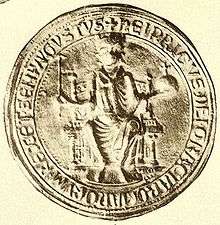Henry Raspe, Landgrave of Thuringia
| Henry Raspe | |
|---|---|
| Landgrave of Thuringia | |
 Seal of Henry as king | |
| Spouse(s) |
Elisabeth of Brandenburg Gertrude of Babenberg Beatrice of Brabant |
| Noble family | Ludowingians |
| Father | Hermann I, Landgrave of Thuringia |
| Mother | Sophia of Wittelsbach |
| Born | 1204 |
| Died | 16 February 1247 |
Henry Raspe (German: Heinrich Raspe) (1204 – 16 February 1247) succeeded his nephew Hermann II as Landgrave of Thuringia in central Germany in 1241; he later was elected anti-king in 1246–1247 in opposition to Conrad IV of Germany.
Biography
In 1226, Henry's brother Louis IV, Landgrave of Thuringia, died en route to the Sixth Crusade,[1] and Henry became regent for his under-age nephew Hermann II, Landgrave of Thuringia. He managed to expel his nephew and the boy's young mother, St. Elisabeth of Hungary, from the line of succession and ca. 1231 formally succeeded his brother as landgrave.
In 1242 Henry, together with King Wenceslaus I of Bohemia, was selected by Emperor Frederick II to be administrator of Germany for Frederick's under-age son Conrad.
After the papal ban on Frederick imposed by Pope Innocent IV in 1245, Raspe changed sides, and on 22 May 1246 he was elected anti-king in opposition to Conrad.[2] The strong papal prodding that led to his election earned Raspe the derogatory moniker of "Pfaffenkönig" (priests' king).[3] Henry defeated Conrad in the Battle of Nidda in southern Hesse in August 1246, and laid siege to Ulm and Reutlingen.[4] Having suffered a mortal wound, he died February 1247 in Wartburg Castle near Eisenach in Thuringia.[4]
Marriages
In 1228, he married Elisabeth (1206-1231), the daughter of Albert II, Margrave of Brandenburg. After her death, he married Gertrude (c. 1210/1215 – 1241), the daughter of Leopold VI, Duke of Austria. After her death, he married Beatrix (1225-1288), the daughter of Henry II, Duke of Brabant.
All three of his marriages were childless.[5] After his death, the Emperor enfeoffed Thuringia to Henry III, the son of his sister Jutta.
References
- ↑ The Crusade of Frederick II, Thomas C. Van Cleve, A History of the Crusades, Vol. II, ed. Robert Lee Wolff and Harry W. Hazard, (The University of Wisconsin Press, 1969), 446.
- ↑ Eugene L. Cox, The Eagles of Savoy, ( Princeton University Press, 1974), 180.
- ↑ William Stubbs, Germany in the Later Middle Ages, 1200-1500, (Longmans, Green and Co., 1908), 36.
- 1 2 Germany:Narrative (1125-1250), Julia Knodler, The Oxford Encyclopedia of Medieval Warfare and Military Technology, Vol. 1, (Oxford University Press, 2010), 184.
- ↑ Ann Marie Rasmussen, Mothers and Daughters in Medieval German Literature, (Syracuse University Press, 1997), 63.
Bibliography
- Knochenhauer, Theodor (1871). Geschichte Thüringens Zur Zeit Des Ersten Landgrafenhauses (1039-1247). Gotha.
- Galletti, Johann Georg A. Geschichte Thüringens.
- Mägdefrau, Werner (2010). Thüringen im Mittelalter 1130-1310 Von den Ludowingern zu den Wettinern. Jena: Rockstuhl. ISBN 978-3-86777-152-8.
- Warsitzka, Wilfried (2002). Die Thüringer Landgrafen. Dr. Bussert & Stadeler. ISBN 978-3932906220.
Ancestors
| Ancestors of Henry Raspe, Landgrave of Thuringia | ||||||||||||||||||||||||||||||||||||||||||||||||||||||||||||||||||||||||||||||||||||||||||||||||||||||||||||||||||||||||||||||||||||||||||||||||||||||||||||||||||||||||||||||||||||||||||||||||||||||||||||||||||||||||||||||||||||||||||||||||||||||||||||||||||||||||||||||||||||||||||||||||||||||||||||||||||||||||||||||||||||||||||||||||||||||||||||||||||||||||||||||||||||||||||||||||||||||||||||||||||||||||||||||||||||||||||||||||||||||||||||||||||||||||||||||||||||||||||||||||||||||||||||||||||||||||||||||||||
|---|---|---|---|---|---|---|---|---|---|---|---|---|---|---|---|---|---|---|---|---|---|---|---|---|---|---|---|---|---|---|---|---|---|---|---|---|---|---|---|---|---|---|---|---|---|---|---|---|---|---|---|---|---|---|---|---|---|---|---|---|---|---|---|---|---|---|---|---|---|---|---|---|---|---|---|---|---|---|---|---|---|---|---|---|---|---|---|---|---|---|---|---|---|---|---|---|---|---|---|---|---|---|---|---|---|---|---|---|---|---|---|---|---|---|---|---|---|---|---|---|---|---|---|---|---|---|---|---|---|---|---|---|---|---|---|---|---|---|---|---|---|---|---|---|---|---|---|---|---|---|---|---|---|---|---|---|---|---|---|---|---|---|---|---|---|---|---|---|---|---|---|---|---|---|---|---|---|---|---|---|---|---|---|---|---|---|---|---|---|---|---|---|---|---|---|---|---|---|---|---|---|---|---|---|---|---|---|---|---|---|---|---|---|---|---|---|---|---|---|---|---|---|---|---|---|---|---|---|---|---|---|---|---|---|---|---|---|---|---|---|---|---|---|---|---|---|---|---|---|---|---|---|---|---|---|---|---|---|---|---|---|---|---|---|---|---|---|---|---|---|---|---|---|---|---|---|---|---|---|---|---|---|---|---|---|---|---|---|---|---|---|---|---|---|---|---|---|---|---|---|---|---|---|---|---|---|---|---|---|---|---|---|---|---|---|---|---|---|---|---|---|---|---|---|---|---|---|---|---|---|---|---|---|---|---|---|---|---|---|---|---|---|---|---|---|---|---|---|---|---|---|---|---|---|---|---|---|---|---|---|---|---|---|---|---|---|---|---|---|---|---|---|---|---|---|---|---|---|---|---|---|---|---|---|---|---|---|---|---|---|---|---|---|---|---|---|---|---|---|---|---|---|---|---|---|---|---|---|---|---|---|---|---|---|---|---|---|---|---|---|---|---|---|---|---|---|---|---|---|---|---|---|---|---|---|---|---|---|---|---|---|---|---|---|---|---|---|---|---|---|---|---|---|---|---|---|---|---|---|---|---|---|---|---|---|---|---|---|---|---|---|---|---|---|---|---|---|---|---|---|---|---|---|---|---|---|---|---|---|---|---|---|---|---|---|---|---|---|---|---|---|---|---|---|---|---|---|---|---|---|---|---|---|---|
| ||||||||||||||||||||||||||||||||||||||||||||||||||||||||||||||||||||||||||||||||||||||||||||||||||||||||||||||||||||||||||||||||||||||||||||||||||||||||||||||||||||||||||||||||||||||||||||||||||||||||||||||||||||||||||||||||||||||||||||||||||||||||||||||||||||||||||||||||||||||||||||||||||||||||||||||||||||||||||||||||||||||||||||||||||||||||||||||||||||||||||||||||||||||||||||||||||||||||||||||||||||||||||||||||||||||||||||||||||||||||||||||||||||||||||||||||||||||||||||||||||||||||||||||||||||||||||||||||||
| Henry Raspe, Landgrave of Thuringia Born: 1204 Died: 16 February 1247 | ||
| Preceded by Hermann II |
Landgrave of Thuringia 1241–1247 |
Succeeded by Henry the Illustrious |
| Preceded by Frederick II and Conrad IV |
— DISPUTED — King of the Romans 1246 – 1247 Disputed by Frederick II and Conrad IV |
Succeeded by William |